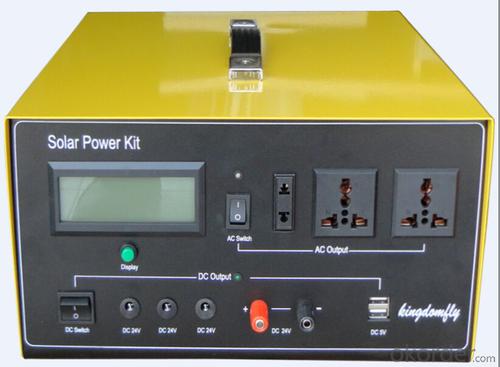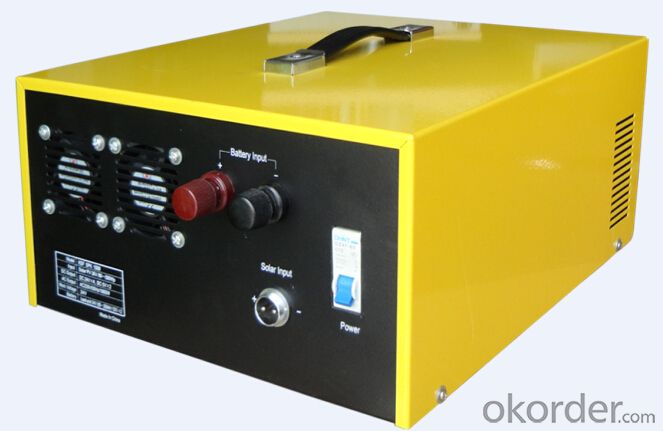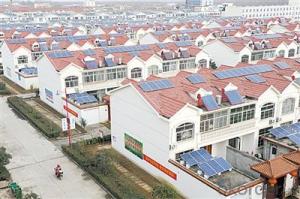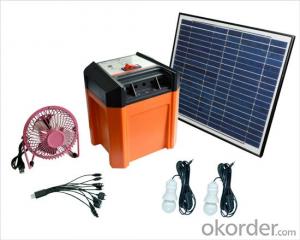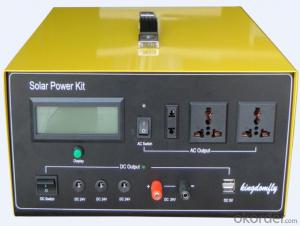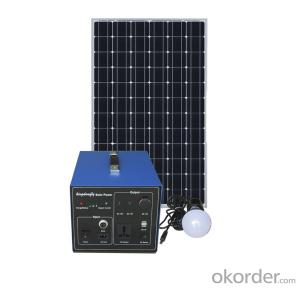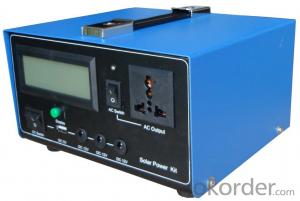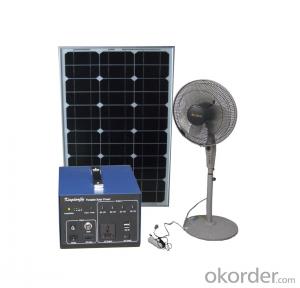Residential Solar Energy Systems - Household Solar Power Kit Hot Selling SPK_P1000
- Loading Port:
- China main port
- Payment Terms:
- TT OR LC
- Min Order Qty:
- 3 pc
- Supply Capability:
- 10000 pc/month
OKorder Service Pledge
OKorder Financial Service
You Might Also Like
Main Information
KDF SPK_P1000 This product is high performance,family used portable solar power system,which can receive energy and store it in battery outside connected to SPK by solar energy on sunny day,and supplies electric power for varies appliances such as electric fan,lighting lamps, television, portable computer etc.It can supply power for both DC and AC electric application .It’s very helpful and useful for home electric supply.
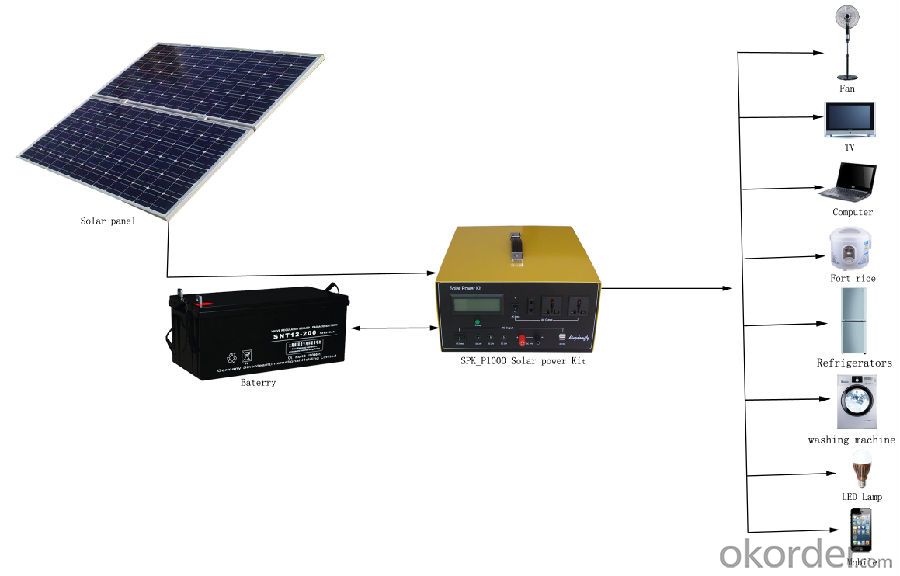
Features:
◆ Battery puts outside connected to the SPK for user to choose battery in recommended range, and easily to exchange battery.
◆ Both DC and AC output
◆ Solar Feedback Circuit Protection
◆ Output Short-circuit Protection
◆ Solar「+」「-」anti-access protection
◆ Output「+」「-」anti-access protection
◆ Over Charged Protection
◆ Over Discharged Protection
◆ Over Load Protection
◆ Over-Temperature Protection
Technical parameters
Specification | Value/Material | |
Item No. KDF | SPK_P1000 | |
Solar Recommended | Specification | Poly silicon |
Working Voltage/Power | 36V/80W~500W | |
Battery Recommended | Rated Voltage/Capacity | 24V50AH~200AH |
Cycle Number | 80% Deep Cycle Number:500 70% Cycle Number:800 | |
Working Temperature | Short Period(one Month):-20~50℃Long Period(Six Months):-10~45℃ | |
Charging Controller | Operating Voltage | 24V |
Input Voltage | 34.6V~42V | |
Input current | MAX:20A | |
Power Consumption | MAX: 15mA | |
Low Voltage Disconnect(LVD) | 21.6V | |
Low Voltage Reconnect(LVR) | 24.6V | |
High Voltage Discharge( HVC) | 29.2V | |
High Voltage Recharge(HVR) | 27.6V | |
Temperature Protection | 60℃ | |
DC Output | DC output & Application | USB 5V2A |
DC output & Application | DC 24V | |
AC Output | Output Wave | Pure sine wave |
Input Voltage | 22V~30V | |
Output Voltage | 220V±10% | |
Output Frequency | 60Hz±2Hz/50Hz±2Hz | |
Rated Output Power | 1000W | |
Maximum VA | 2000VA | |
Maximum Efficiency | 88% | |
Temperature | 0-40℃ | |
Over Temperature | 60℃~70℃ | |
Low Voltage Alarm | 22V | |
Low Voltage Shut off | 21V | |
High Voltage Shut off | 30V | |
Package | Set size | 350*449*227mm |
Set N·W | 7.2kg | |
Set N·W | 5.2kg | |
LCD_Display
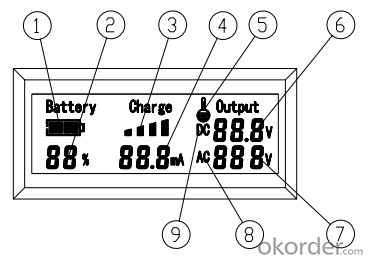
No. | Name | Function |
1 | Battery Icon | To show the Volume of the Battery |
2 | Date of % | To show the percent of the Battery |
3 | Charging Icon | To show the charging condition |
4 | Current | To show the value of charge current |
5 | Temperature Icon | Temperature Alarm |
6 | Date of Voltage | To Show the Value of DC output voltage |
7 | Date of Voltage | To Show the Value of AC output voltage |
8 | AC Icon | AC output |
9 | DC Icon | DC output |
- Q: Can solar panels be installed on carports or parking structures?
- Yes, solar panels can be installed on carports or parking structures. In fact, it is a popular choice as it allows for efficient use of space and provides shade for cars while generating clean energy.
- Q: Can solar energy systems be used in disaster-prone areas?
- Yes, solar energy systems can be used in disaster-prone areas. In fact, they can prove to be extremely beneficial in these areas. Solar energy systems are resilient and can continue to function even during power outages caused by natural disasters. They provide a reliable and sustainable source of electricity, which can be crucial for emergency response efforts, powering communication systems, medical equipment, and providing lighting and heating. Additionally, solar energy systems can help reduce dependence on fossil fuels, contributing to a more sustainable and environmentally-friendly recovery and rebuilding process.
- Q: What are the benefits of using solar energy systems?
- There are several benefits of using solar energy systems. Firstly, they are a renewable source of energy, meaning that they can generate electricity without depleting natural resources. Secondly, solar energy systems produce clean energy, as they do not emit any greenhouse gases or pollutants during operation, contributing to a healthier environment. Additionally, solar energy systems can help reduce electricity bills, as they provide a cost-effective way of generating electricity for homes or businesses. Finally, installing solar panels can also increase the value of a property and create job opportunities in the renewable energy sector.
- Q: Can a solar energy system be installed on a commercial building?
- Yes, a solar energy system can be installed on a commercial building. In fact, many businesses have embraced solar power as a sustainable and cost-effective solution for their energy needs. Installing a solar energy system on a commercial building offers multiple benefits, including reduced electricity bills, potential tax incentives and rebates, increased property value, and a positive brand image associated with environmental responsibility. Commercial buildings typically have ample rooftop space, making them ideal for solar panel installation. Additionally, advancements in solar technology have made it easier and more efficient to integrate solar systems into commercial buildings. With proper planning and professional installation, a solar energy system can provide clean and renewable energy to power various operations within a commercial building, contributing to a greener and more sustainable future.
- Q: Can a solar energy system be installed in an area with a high earthquake risk?
- Yes, a solar energy system can be installed in an area with a high earthquake risk. However, specific design considerations and engineering expertise are required to ensure the system can withstand seismic activity. Implementing advanced mounting systems, utilizing flexible wiring, and reinforcing structural supports are some of the measures taken to enhance the system's resilience against earthquakes.
- Q: What are the environmental impacts of manufacturing solar panels?
- The manufacturing of solar panels has both positive and negative environmental impacts. On the positive side, solar panels produce clean and renewable energy, reducing the demand for fossil fuels and mitigating greenhouse gas emissions. This helps combat climate change and air pollution, which are major environmental concerns. However, the production process of solar panels is not entirely without negative consequences. The initial stage involves the extraction and processing of raw materials, such as silicon, silver, aluminum, and glass, which can have environmental impacts. Mining for these materials can lead to habitat destruction, soil erosion, and water pollution if not properly managed and regulated. Moreover, the manufacturing process itself requires energy, which is often derived from conventional power sources like coal or natural gas. This can contribute to carbon emissions and air pollution during the production phase, offsetting some of the environmental benefits of solar energy. Additionally, the disposal of solar panels at the end of their life cycle can pose environmental challenges. Most solar panels contain hazardous materials, such as lead and cadmium, which can leach into the soil and water if not properly handled. Ensuring proper recycling and disposal methods for end-of-life solar panels is crucial to minimize potential environmental harm. Despite these concerns, it is important to note that the environmental impacts of manufacturing solar panels are relatively minimal compared to the long-term benefits they offer in terms of clean energy generation and reducing greenhouse gas emissions. Continuous advancements in technology and manufacturing processes are also helping to minimize the environmental footprint of solar panel production. Overall, while there are some environmental consequences associated with manufacturing solar panels, their positive impacts on reducing carbon emissions and promoting renewable energy far outweigh the negatives. It is essential to continue investing in research and development to further improve the sustainability of solar panel production and address any potential environmental challenges.
- Q: How long does a solar energy system last?
- A solar energy system typically lasts for around 25 to 30 years.
- Q: How much do solar energy systems cost?
- The cost of solar energy systems can vary depending on various factors such as the size of the system, location, and specific requirements. Generally, the cost can range from a few thousand dollars for smaller residential systems to tens of thousands of dollars for larger systems or commercial installations. It is recommended to consult with a solar energy provider to get a more accurate estimate based on individual needs.
- Q: What are the economic benefits of using solar energy systems?
- The economic benefits of using solar energy systems include reduced energy costs, long-term savings, job creation, and increased local investment. Solar energy systems can significantly lower electricity bills by generating electricity from the sun, reducing reliance on traditional energy sources. Additionally, the long lifespan of solar panels allows for long-term savings as they require minimal maintenance and have no fuel costs. The growing demand for solar energy also creates new job opportunities in the installation, manufacturing, and maintenance sectors. Moreover, investing in solar energy systems stimulates local economies by keeping energy spending within the community and reducing reliance on imported energy sources. Overall, the economic benefits of using solar energy systems contribute to sustainability, cost-effectiveness, and the growth of green industries.
- Q: Can solar energy systems be used for powering remote sensing devices?
- Yes, solar energy systems can be used to power remote sensing devices. Solar panels can convert sunlight into electricity, which can then be used to power various types of remote sensing devices such as weather stations, environmental monitoring systems, and satellite communication equipment. This allows for the collection and transmission of data in remote areas where access to traditional power sources may be limited or unavailable.
Send your message to us
Residential Solar Energy Systems - Household Solar Power Kit Hot Selling SPK_P1000
- Loading Port:
- China main port
- Payment Terms:
- TT OR LC
- Min Order Qty:
- 3 pc
- Supply Capability:
- 10000 pc/month
OKorder Service Pledge
OKorder Financial Service
Similar products
Hot products
Hot Searches
Related keywords



